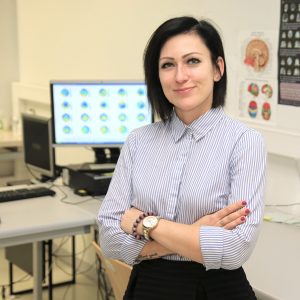
7 November
INTERNATIONAL DAY OF MEDICAL PHYSICS

„Save the date” is a series of articles that have been written to celebrate various unusual holidays. The authors of the presented materials are students, doctoral students and employees of the Faculty of Science and Technology of the University of Silesia.
7 November is celebrated International Day of Medical Physics.
Fot. Małgorzata Kłoskowicz
Karina Maciejewska, PhD
Institute of Biomedical Engineering
What is medical physics, why does it have its own special day in the calendar, these and other questions will be answered today by Karina Maciejewska, PhD, from the Institute of Biomedical Engineering of the Faculty of Science and Technology:
Every year, on 7 November, the International Organisation for Medical Physics (IOMP) organises the International Day of Medical Physics.
The date wasn’t chosen by accident, as it is the day of birth of Marie Sklodowska-Curie, a two-time Nobel Prize winner and pioneer of research on radioactivity. This year’s theme for the Day of Medical Physics is: “Communicating the Role of Medical Physicists to the Public”.
Medical Physics is a branch of physics that uses the principles, methods, and techniques of physics in clinical practice and research to prevent, diagnose, and treat diseases in order to improve human health and well-being. It is an interdisciplinary field of science including, but not limited to radiation oncology physics, medical imaging, nuclear medicine, radiation protection, non-ionising radiation, and physiological signal measurements.
Medical physicists are professionals with specialised education and training in the methods of applying physics to medicine. Working in clinical, academic, research, and industrial institutions, they are concerned with the application of principles and techniques of medical physics in the prevention, treatment, and diagnosis of disorders, diseases, and disabilities and the protection of patients, staff, and members of the public from the dangers of ionizing and non-ionizing radiation.
The Medical Physics degree programme at the University of Silesia in Katowice trains future medical physicists, who are prepared to work in interdisciplinary medical teams, carry out dosimetry, and become experts in various majors of Medical Physics.
The Biomedical Engineering Team studies, among others, the electrical activity of the brain with the use of electroencephalography (EEG) and event-related potential (ERP) related to cognitive functions (e.g. attention, memory); analysis of other biomedical signals; application of infrared thermography in stomatology, oncological diseases, physical medicine, and sport; and also examines physiological fluids using differential scanning calorimetry to develop unconventional methods in medical diagnostics and sports medicine.
The next day we celebrate World Radiography Day, commemorating 8 November 1895, when Wilhelm Conrad Röntgen discovered x-radiation.
We wish you many beaming and radiant smiles






